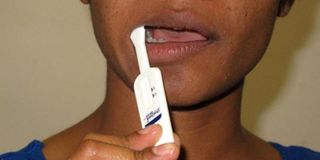Government to introduce oral HIV self-test kit

Step one. You swab the self-test kit on your lower and upper gum.
What you need to know:
- Dr Josphine Birungi, a researcher at the Aids Support Organisation (Taso), said the antibody test does not use a blood sample unlike the currently used antigen test used by the Health ministry, known as polymerised Chain Reaction.
- According to the recently released Uganda Demographic and Health Survey 2016, about 47 per cent of men aged between 15 and 49 had ever tested and received their HIV status results in the last 12 months compared to 55 per cent of the women.
KAMPALA. The Ministry of Health is considering introducing an oral HIV self-test kit it hopes will prompt men to establish their HIV/Aids status.
This follows findings of a research study by Makerere University that indicated the self-test kit is a feasible way to promote male-partner HIV testing.
The study, which was headed by the School of Public Health and Mildmay Uganda, was conducted in Entebbe Municipality, Mpigi and Nakaseke districts.
According to the study, seven in 10 men enrolled had accepted to know their HIV status using the antibody self-test kits, which provide results in less than 20 minutes.

Step two. Insert the kit into the testing solution.
While presenting the research study results yesterday in Kampala, Dr Joseph Matovu of Makerere University School of Public Health, who was also the study co-investigator, said the HIV self-test skits work by collecting the oral fluid from the gums.
“You swab the self-test kit on your upper gum and the lower and it’s this swabbing that captures fluids on the gum before being put in testing solutions,” Dr Matovu said, adding that HIV antibodies from oral fluid are collected through the swab.
“The kit after being inserted in the solutions will start to show lines. If it shows one line that means you are negative if its shows two lines, it means that you are HIV positive but you need to do a confirmatory test in a health facility,” he added.

Step three . Check the kit for final results of the test.
Dr Joshua Musinguzi, who heads the Aids Control Programme of the Ministry of Health, said: “The results of the HIV self-test kit are acceptable and feasible and [it] is something that could be adopted in the current testing guidelines.”
Dr Musinguzi said the oral swab is used for self-testing and requires no blood.
Dr Josphine Birungi, a researcher at the Aids Support Organisation (Taso), said the antibody test does not use a blood sample unlike the currently used antigen test used by the Health ministry, known as polymerised Chain Reaction (PCR).
However, Dr Matovu said the oral HIV self-test kits are not yet available on the market for public use but the study is meant to inform the process of introducing them as one of the ways of testing HIV.
“The low uptake of HIV testing services by men in the country informed our study,” he said, adding that it was meant to assess whether couples can disclose their HIV status between themselves.
He said self-test kits used in the study were given to pregnant women during their antenatal visits to take to their husbands and to be returned to them after performing the test.
According to the recently released Uganda Demographic and Health Survey 2016, about 47 per cent of men aged between 15 and 49 had ever tested and received their HIV status results in the last 12 months compared to 55 per cent of the women.




